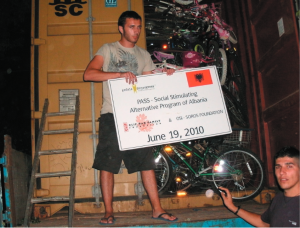This paper recently came to our attention: Cycling to School: Increasing Secondary School Enrollment for Girls in India
Category Archives: bicycles
Esi and her school transport
 Esi is a teenager who lives in a small village in the Nkwanta North District of the Volta Region. She is a student at Nkwanta Senior High School. The school is located so far away from where Esi lives that it would take her two hours to walk there. With the school day beginning at 7AM, Esi had no choice but to be up every morning well before 5 in order to be sure to get to class on time. Furthermore, the road she travels on is frequently a busy one, making her daily trek all the more arduous and slow-going. All of these factors contributed to Esi’s fatigue, which was obviously detrimental to her health, especially at a developmental age. It also made it difficult for her to be attentive during school and hard for her to dedicate energy to schoolwork in and out of class. After receiving her bicycle from WEBike, Esi found she was able to negotiate the distance between school and home within an hour, sometimes even managing it in 45 minutes. She is no longer unnecessarily exhausted and is sure to be on time, prepared, and fully alert in class each day.
Esi is a teenager who lives in a small village in the Nkwanta North District of the Volta Region. She is a student at Nkwanta Senior High School. The school is located so far away from where Esi lives that it would take her two hours to walk there. With the school day beginning at 7AM, Esi had no choice but to be up every morning well before 5 in order to be sure to get to class on time. Furthermore, the road she travels on is frequently a busy one, making her daily trek all the more arduous and slow-going. All of these factors contributed to Esi’s fatigue, which was obviously detrimental to her health, especially at a developmental age. It also made it difficult for her to be attentive during school and hard for her to dedicate energy to schoolwork in and out of class. After receiving her bicycle from WEBike, Esi found she was able to negotiate the distance between school and home within an hour, sometimes even managing it in 45 minutes. She is no longer unnecessarily exhausted and is sure to be on time, prepared, and fully alert in class each day.
Bikes Take Root in the Balkans
by Jola Foto
Spring 2011 InGear
Throughout the cities of western and northern Europe public bicycle services have been established that encourage and increase the use of bicycles as healthy and ecologically-sound transport. Through these services subscribers can rent bikes in easily accessible locations throughout the city and when finished return them to any other convenient station in the network. PASS has long wished to emulate this type of system in Albania and by the end of December, 2010 we will have four stations set up around Tirana, the capital. Tirana Community Bicycle, the first bicycle-sharing program in the Balkans, is an initiative of the PASS organization undertaken with funding support from the Open Society Foundation of Albania (OSFA is a Soros Foundation democratization program for Albania) and a generous contribution from Pedals for Progress, which donated the first 500 bicycles. Thanks to P4P’s contribution, our project was implemented and we were encouraged to advance and expand it.
The city of Tirana, and especially its center, is quite suitable for transportation by bicycle. The downtown area is dense, the terrain is flat, and the climate is mild. The short distances and easy conditions make cycling a fast and practical way of moving in the center of the city, and may be the best means of meeting the needs of the citizens of Tirana.
Given the heavy traffic situation in the center of the city and air pollution from CO2 emissions, we believe that this service will be a valuable contribution to the community. PASS has been promoting the new system for some time before the placement of the public bicycle stations. In the course of our other social activities, and in conjunction with our P4P-supported bike retail shop EcoVolis, we have involved the citizens of Tirana by soliciting suggestions regarding form, logo, and slogan. We have also organized awareness activities with the young people of Tirana. For instance, on September 22nd, a national activity day called “A Day Without Cars,” we distributed over 200 bicycles in the Youth Park, Mother Theresa Square, and the Ministry of Education for the “transport by bicycle” learning activity. In January, we will donate 30 bicycles and organize bike training for the children.
We hope that the Tirana Community Bicycle service will be properly consolidated in 2011, with a targeted number of daily uses of the public bicycles by citizens. By doing this we wish to promote the use of bicycles as a mode of transport for commuting or performing other daily activities and increase their use in our city.
52nd Container to Rivas
May 18th, 2013, marked the shipment of the 52nd container of bicycles to EcoBici in Rivas, Nicaragua. Our relationship with this organization is the longest in our 23 years of partnership building. This current delivery contains 580 bikes that add to the 22,044 cycles already in circulation in the region and will contribute to the organization’s goal of community development and focus on enabling much-needed reforestation in the region.
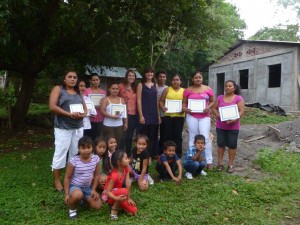 P4P is also pleased to add 6 sewing machines to the container shipment. Our readers are of course already familiar with the Clif Bar Family Foundation’s steady and generous support of our programs and so it is not unexpected that the shipping and import taxes have been covered by them. What is new here is that the sewing machines are destined for a different locale in the region. In April, we were contacted by Noelle London, a Peace Corps volunteer who is involved in small business development in Nicaragua. London wrote that she lives on Ometepe, an island close to Rivas. This island, situated on Lake Nicaragua, is steadily becoming a tourist destination and she informed us that, currently, most of the souvenirs visitors purchase there tend to be made in Granada or Masaya.
P4P is also pleased to add 6 sewing machines to the container shipment. Our readers are of course already familiar with the Clif Bar Family Foundation’s steady and generous support of our programs and so it is not unexpected that the shipping and import taxes have been covered by them. What is new here is that the sewing machines are destined for a different locale in the region. In April, we were contacted by Noelle London, a Peace Corps volunteer who is involved in small business development in Nicaragua. London wrote that she lives on Ometepe, an island close to Rivas. This island, situated on Lake Nicaragua, is steadily becoming a tourist destination and she informed us that, currently, most of the souvenirs visitors purchase there tend to be made in Granada or Masaya.
London informed us that, with reliable and efficient tools, the local women could develop a thriving base of manufacture in their community of Balgüe: “They have begun to sell in a couple of locations on the island and even in a fair in Managua but are unable to keep up with the current demand as they only have 3 working machines.”
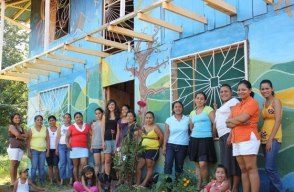
This region is ideal for building a tourist trade in local crafts as there are many attractions to draw steady crowds yearly. The beaches on the island of Ometepe are black volcanic sand, and the lake, long separated from the ocean by an earthquake, is an ideal location to observe the many species who have adapted to this environment. Lake Nicaragua is the only lake in the world with very large freshwater sharks. Tours of the island include trips to Altagracia and its Pre-Columbian stone statues and to Magdalena Farm in Balgüe where organic coffee is grown. It is a lush land with fertile soil fed from the Volcano Maderas.
London included this statement in her e-mail to us: “I have normally been the one to shy [local women] away from donations, as they have to eventually [establish] a fully sustainable business as opposed to a project. However, after working with them on productivity countless times, I have come to understand that they simply lack the sufficient resources to really take off.” What stands out to us at P4P is London’s very realistic take on the development of self sufficiency. Charity does not build business infrastructure. Long-term goals, reliable tools, and ongoing training programs are the only hope for people in places like Ometepe to foil the existence of questionably sourced “authentic” souvenirs of their own region and take control of the industry for themselves. This is a beneficial situation for visitors of the region as well, of course. Value is added to the experience of visiting a country where the textiles and other mementos are made by local people and cooperatives. Even better if a visit to the places of manufacture are part of a tour itinerary.
“It has been a pleasure to work with these motivated and talented women. They have dealt with countless obstacles and have continued to fight to keep their business afloat,” states London. P4P is very happy to see the contents of one container contribute to an old reliable partnership in Rivas and a new and promising one on Ometepe.
Country Update: Guatemala
Spring 2013 InGear
Doña Marina lives in the town of San Andrés Itzapa, Chimaltenango, Guatemala in the county of San Antonio. Growing up, Marina’s family was very poor. She was never given the opportunity to attend school as her father died in 1980, leaving her with the responsibility of taking care of both her mother and her handicapped sister.
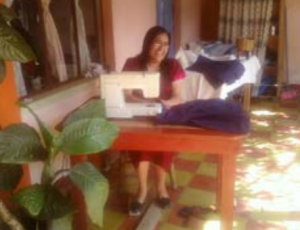 To help provide for the family, Marina learned to sew. She started out making aprons and small cushions, each of which sold for the equivalent in American currency of one penny and one-and-a-half pennies respectively. Over time, Marina’s skill improved so that she was capable of sewing blouses, skirts, day dresses, wedding dresses, and women’s pants. For many years, she used the same sewing machine: an extremely old, foot-operated model. This made performing the work integral to her livelihood a laborious and protracted task.
To help provide for the family, Marina learned to sew. She started out making aprons and small cushions, each of which sold for the equivalent in American currency of one penny and one-and-a-half pennies respectively. Over time, Marina’s skill improved so that she was capable of sewing blouses, skirts, day dresses, wedding dresses, and women’s pants. For many years, she used the same sewing machine: an extremely old, foot-operated model. This made performing the work integral to her livelihood a laborious and protracted task.
However, in the year 2000, Marina received her first electric sewing machine from Pedals for Progress partner, FIDESMA. This greatly increased the ease with which she could produce garments. Furthermore, as a result of the added speed provided by an electric sewing machine, Marina was able to take on many more jobs. Eventually, in 2012, she made enough money to purchase herself a second sewing machine.
Doña Marina is extremely grateful to Pedals for Progress and FIDESMA for giving her the opportunity to own two electric sewing machines despite her low income. She is now able to work much more rapidly and can produce multiple items of clothing daily. Now, with the extra money she makes, Marina can better support her sister and her elderly mother.
Héctor Rolando Sunuc Mututz is a 33-year old Guatemalan who has worked for the Catholic mission, The Apostles of Infinite Love, since he was a child. Born into a poor family, Rolando always needed to make money, forcing him to abandon his education after completing elementary school. With his family having so few resources, The Apostles of Infinite Love took care of and looked after Rolando throughout his childhood. Now, as an adult he is still with the mission and has become one of its key employees.
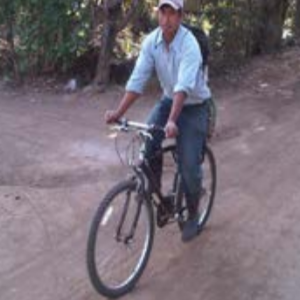
Rolando is married and has four children. He and his family live in the town of San Andrés Itzapa, 2km away from the mission. In need of transportation to and from work, Rolando’s only option initially was to hire a motorized tuk-tuk on a daily basis. However, considering his modest income, this was not a practical solution to his transportation problem. So, Rolando turned to FIDESMA, a Pedals for Progress partner that distributes bicycles, supports agricultural extension, and performs other services within the community of the San Andrés Itzapa area.
The bicycle Rolando received from FIDESMA and P4P provides him with his own method of transportation for his daily commute. Furthermore, with the goal of him and his family becoming fully self-sufficient, Rolando has acquired some land on which he grows corn, beans, and various other fruits and vegetables. However, the land is 10km away from his home. He is only able to tend to his garden and keep it flourishing thanks to his bicycle that allows him to make the 20km round trip once every week.
Rolando states that he is very thankful to FIDESMA and Pedals for Progress for their bicycle program. As affordable transportation options in his area are scarce, Rolando would have to walk for hours and hours to accomplish what he can instead do quite rapidly now that he has a bike. Above all, Rolando is just happy to have the ability to get to where he needs to go on his own terms.
Microloans and Bicycles in Vietnam
Spring 2013 InGear
Tran Thi Cam Nhung is a farmer living with her family in the Vinh Long province of southern Vietnam. Nhung and her husband, Nguyen Van Can, have two children, a five-year-old son and a thirteen-year-old daughter. Having little money, Nhung and her family have always had to work hard to make ends meet.
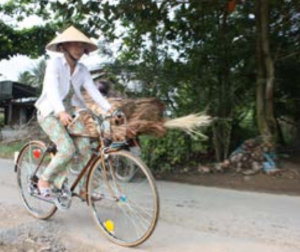 In 2009, Nhung joined the microfinance program of the Dariu Foundation, a partner with Pedals for Progress. The Dariu Foundation provides low-income families such as Nhung’s with microloans to assist them in the process of generating savings. The group also offers financial services poorer families would normally not have access to, such as help with fostering basic savings skills, investment advice, and guidance toward making sure money does not go wasted.
In 2009, Nhung joined the microfinance program of the Dariu Foundation, a partner with Pedals for Progress. The Dariu Foundation provides low-income families such as Nhung’s with microloans to assist them in the process of generating savings. The group also offers financial services poorer families would normally not have access to, such as help with fostering basic savings skills, investment advice, and guidance toward making sure money does not go wasted.
Nhung took out several loans for the purpose of investing in her farm, on which she grows rice and various vegetables and raises animals such as pigs and chickens. Her daughter, currently in seventh grade, spends half her days at school and half at home, helping her mother on the farm by tending the crops, feeding the animals, and collecting eggs.
Although Nhung and her family work hard to grow and maintain their farm, they do not have much to work with, only owning a small plot of land. As such, Nhung and her husband Can must work whatever other jobs they are able to find to support the family.
Can works as a mason, taking construction-site positions and working at brick manufacturing plants. Nhung, too, works various labor-intensive positions, some days spending long hours harvesting in rice fields, other days gutting and cleaning fish at local fish processing operations. With the two parents working so much, their daughter must take time off from school to—in addition to working on the farm—help with house chores and pick up and look after her younger brother once he is done with kindergarten for the day.
Unfortunately, a lack of transportation limited Nhung and Can’s ability to find work. They were only able to take jobs at nearby villages within walking distance and found the amount of work available in these places to be sparse. Though the entire family was pitching in, being able to travel no further than their immediately surrounding areas severely hindered whatever potential there might have been for them to create a stable income.
However, in September of 2012, out of hundreds of disadvantaged women, Tran Thi Cam Nhung was chosen to receive a used bicycle jointly donated by Pedals for Progress and the Dariu Foundation. Having the bicycle has since proven to be a great boon to the family’s livelihood, helping them in every facet of their daily routine.
Now Nhung is able to make more money from her farm by transporting eggs, vegetables, chickens, and pork to the local market for sale early every morning. Afterward, her husband will ride the bike to villages farther off where more masonry work is available. The couple’s income has doubled, raising their earnings from $5 to $10 per day on average—a considerable difference for a family of humble means in rural Vietnam. Furthermore, now that the couple can use their bicycle to find work more easily and make money more readily, they can gradually spend less time searching for employment and more time with their children.
This is just one story. Since 2011, the Dariu Foundation has been assisting numerous families throughout Vietnam, thus far distributing over one-thousand used bicycles, all donated by Pedals for Progress.
Call for Action to Policy Makers and Pioneers of Change
ADOPTED BY
INTERNATIONAL ENVIRONMENTAL LAUREATES, European Environment Foundation
15 MARCH 2013
FREIBURG, GERMANY
We are greatly alarmed to be witnessing the development of several closely related, mutually compounding crises as a result of the global spread of materialism: a great imbalance in wealth and poverty, hunger and malnutrition, climate change, biodiversity losses, resource use and other ecological crises, financial crises, excessive military expenditure, public debt in many countries, and high (youth) unemployment.
Environmental degradation can now be increasingly observed in emerging economies, closely paralleling unsustainable developments in the industrial nations in the last century. This classic growth model based on excessive consumption has no future – neither globally nor for established industrialised countries. The development of a sustainable society must be our common goal. Based on the efficient use of energy and resources, the expansion of the education and knowledge sectors, green jobs (including low budget jobs), sustainable technologies and social innovations focusing on the common interest of people, this aim would meet people’s essential needs and safeguard prosperity worldwide, protecting the environment.
Any future for human civilization will build on justice as well as social and technological innovation. The current way that development and dissemination of technology is governed needs to change, to build on the basic tenet that everyone on the planet, not only today but including future generations, should have access to technology which enhances the quality of life.
Progress in international negotiations which aim to improve global conditions is, unfortunately, unsatisfactory and painfully slow. Nonetheless, these international processes must continue. Due to the worsening of climate change and the growing frequency and intensity of climate-related disasters, the international community needs to reach an agreement that will provide for effective measures of reducing greenhouse gas emissions to meet the agreed 2°Cmax goal before 2015 and implement it before 2020. The requisite instruments for tracking compliance are available now. The negotiations have long been generating important impetus for local; regional, national and international initiatives, and individual technological developments, but have not yet achieved global consensus. Parallel to the international negotiations, technological and action programs can and must be initiated at local, national, bilateral and international level.
The major opportunities afforded by a sustainable economy and the transformation of energy systems have still not been fully recognised. We call on governments and enterprises around the world to adopt strategies to improve energy efficiency, resource recovery and increase the share of renewable energy and implement renewable technologies in rural and remote areas.
2
We urge governments, enterprises, local authorities and individuals to take immediate action and to become pioneers of change and successful social innovation, and to galvanize younger generations, encouraging them to strive for their present and future rights.
We place our hopes in Coalitions of Winners. Such coalitions will
inspire equitable and informed societies and stimulate carbon-neutral economies
formulate positive goals towards a sustainable future,offering enough for all for ever,
set targets and provide focused support for technical and social innovation towards a sustainable future,
ensure that funding is channelled towards future-oriented markets,
utilise innovation to support sustainable livelihoods,
increase energy efficiency, drastically reduce fossil fuel and stop nuclear energy use and reduce greenhouse gas emissions through these endeavours,
introduce adequate legal and economic instruments to prevent ecological destruction and penalize overconsumption.
We propose the following specific strategies:
1. Universal access to modern energy services and formulation of positive targets for energy efficiency and renewable energy use -at least doubling the global rate of improvement in energy efficiency and doubling the share of renewable energy in the global energy mix by 2030the United Nations’ initiative on “Sustainable Energy for All” (SEFA) has proposed, or earlier.The progress should be monitored by an international agency.
2. Accelerated development and use of sustainable innovations of global significance in the sector of energy efficiency and renewable energies. Examples are highly energy-efficient buildings, electrical equipment, solar-powered cooling systems, solar-powered drinking water desalination, efficient public transport systems, zero-emission vehicles, high-efficient, low-cost renewable systems and storage technologies, especially products adapted to the needs of poor communities (e.g. simple renewable energy and water purification systems). Possible measures include the launch of international business competitions (a good example is Golden Carrot in the US, with awards and innovation targets, quality standards, environmental goals, maximum prices and minimum sales volumes) and highly effective market-stimulating feed-in tariffs started in Germany and adopted in more than 60 countries worldwide.
3. Funding and incentivizing innovation and infrastructural development using the following measures: abolition of environmentally harmful subsidies such as fossil fuel subsidies, implementation of financial transaction tax and green taxation (such as a CO2-tax), which must be accompanied by assistance for poor households, reductions in military spending including the abolition of nuclear weapons, and an exclusive focus on sustainable innovations and infrastructure in future economic stimulus programmes.
4. The acknowledgement by the planet’s leading corporations of the environmental and social impacts of their business practices, and their subsequent adoption of the systems and technologies necessary for a sustainable and equitable future.
We see the current critical situation as a failure of imagination. It is not the dream of a sustainable society that is unrealistic, but the blind belief that the status quo can be prolonged with marginal adjustments. Our call for action is about creating an inspiring future that is more ecologically secure and socially just than current policies can produce.
We therefore welcome the strongly increasing civil society initiatives. It is up to each and everyone to create the world that we are proud to pass on to future generations.
Environmental laureates from 44 countries demand urgent change in global environmental and climate protection
Press Release
Freiburg, Germany, 16 March 2013
Two-speed model instead of search for the lowest common denominator within the international community
Freiburg, Germany, 16 March 2013 – Until this coming Sunday, the 2nd International Convention of Environmental Laureates is being staged by the European Environment Foundation (EEF) in Freiburg, Germany. Today a declaration in which the participating environmental laureates urge a fundamental change in environmental and climate policy was signed. The constant search for the lowest common denominator within the international community must be replaced by a two-speed model. The participants at the convention specify four concrete fields of action in their declaration.
What distinguishes the EEF International Convention of Environmental Laureates from other conferences and summits is the diversity of its participants. Eighty winners of internationally renowned environmental prizes have come together from 44 countries. The conference delegates cover a wide spectrum, from scientists to environmental and civil rights activists, from successful ecological entrepreneurs to publicists and critics of capitalism. The EEF is convinced that such a broad base is necessary to put global environmental and climate protection on a new, workable footing.
The EEF does not see its convention as a contrary model to the major international environmental and climate summits. The laureates are of the opinion, however, that developments have reached a point at which the field should no longer be left entirely to career politicians. “The environmental and climate summits in the international political arena scarcely go beyond mere bartering over emission limits and volumes”, explains Eicke Weber, Chairman of the Board of Trustees of the EEF and Head of the Fraunhofer Institute for Solar Energy Systems (ISE). As Ernst Ulrich von Weizsäcker, Member of the Board of Trustees of the EEF and Co-President of the Club of Rome points out, “These international negotiations must continue, however, since they have indeed long been generating important impetus for initiatives in individual countries, bilateral agreements and vital technological developments. If we continue in this way, though, we are unlikely to succeed in finding the lowest common denominator within the international community on the subject of global environmental and climate protection.”
In their declaration, entitled “Call for Action to Policy Makers and Pioneers of Change”, the participants at the convention express their alarm in the face of the current accumulation of crisis situations. These, in their opinion, are closely related on various levels and mutually detrimental. They are the imbalance in wealth and poverty, the problem of hunger and malnutrition, climate change and other ecological crises, financial crises and excessive debt in many countries and, finally, high unemployment particularly among young people. According to Rainer Grießhammer, Member of the Board of Trustees of the EEF and Head of the Institute for Applied Ecology in Freiburg, “These undesirable global trends can no longer be tackled in isolation. The current standard growth model does not deliver the necessary control information and impetus for a sustainable future.” The participants at the Freiburg convention are suggesting concrete solutions and fields of action. Their assumption is that the search for the lowest common denominator on the subject of global environmental and climate protection has brought us to a virtual standstill. The environmental laureates advocate a two-speed model in their declaration. “The pioneers in global environmental and climate protection should not wait, but rather press ahead and demonstrate to the international community the economic benefits of the sustainable use of natural resources”, says Peter W. Heller, Member of the Board of Trustees of the EEF and Head of the Canopus Foundation.
With its convention, the EEF has created a platform to make successfully implemented solutions to environmental and climate protection problems more widely known and accessible. “An important objective of the EEF, and a key factor in the success of our cause, is the creation a network of these highly successful laureates from the most varied fields”, explains Chairman of the Foundation, Bernd Dallmann. “In this respect, the International Convention of Environmental Laureates is a unique global event.”
The declaration specifies four concrete fields of action:
- Universal access to modern energy supplies in conjunction with the formulation of positive targets for energy efficiency and the use of renewable energies, such as the doubling at least of the proportion of renewable energies in the global energy mix and a significant increase in energy efficiency. Progress should be monitored by an international agency.
- Accelerated development of sustainable innovations in the fields of energy efficiency and renewable energies which have global significance, in other words, those which are relevant to people. The technologies in question are generally already in place, for example, energy-efficient buildings and electrical appliances, solar-powered cooling systems, solar-powered desalination facilities for the production of drinking water, efficient public transport systems, zero-emission vehicles, highly efficient and economical renewable energy systems and storage technologies. First and foremost, these are products which are targeted at the needs of poorer regions, such as simple power supplies and water purification systems. The convention cites international business competitions such as the “Golden Carot” program in the US and highly effective market-stimulating feed-in tariffs started in Germany and adopted in more than 60 countries worldwide as positive and particularly successful examples of suitable incentive programmes.
- Financing of innovation and infrastructure development by the abolition of environmentally harmful subsidies, the introduction of financial transaction taxes and green taxation such as a CO2-tax, reductions in military spending including the abolition of nuclear weapons, and an exclusive focus on sustainable innovations and infrastructure in future economic stimulus programmes.
- The acknowledgement by the planet’s leading corporations of the environmental and social impacts of their business practices, and their subsequent adoption of the systems and technologies necessary for a sustainable and equitable future.
The environmental laureates participating at the convention see the current critical situation as a failure of imagination. It is not the dream of a sustainable society that is unrealistic, but the blind belief that the status quo can be prolonged with marginal adjustments.
About the European Environment Foundation
The European Environment Foundation founded in 2011 intends to provide new impulses for environmental and climate policies. It has set the aim of promoting communication and professional exchanges between society, politics, research and business across the globe and across all disciplines. The founders and chairmen of the Foundation are Dr. Bernd Dallmann and Dipl.-Ing. Rolf Hiller. The Board of Trustees of the Foundation is composed of 13 well-known persons from the sectors of environmental and climate protection. The Chairman of the Board of Trustees is Prof. Dr. Eicke R. Weber, director of the Fraunhofer Institute for Solar Energy Systems ISE. The Foundation headquarters are located in Basel, Switzerland.
About the 2nd International Convention of Environmental Laureates:
The EEF’s 2nd International Convention of Environmental Laureates from 14 to 17 March 2013 will bring together winners of prestigious international environmental prizes in Freiburg im Breisgau. More than 80 laureates from 44 countries have confirmed their attendance. The convention has as its motto “New Coalitions – To Address Limits to Growth”. Key themes are sustainable jobs through sustainable policies, a two-speed model with individuals, regions and countries acting as environmental and climate protection pioneers and an update on the report to the Club of Rome on limits to growth. The convention initiated by the EEF is intended to be an international platform for the exchange of experiences and concrete proposals for solutions. 2nd International Convention of Environmental Laureates 2013
Salvadoran Appropriate Technology Center
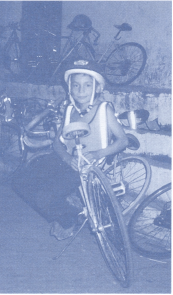 Naum Antonio Recina Halas was hooked as soon as the fleet of cyclists passed his shoulders, shouting as they navigated the concrete cobblestones of the town of Suchitoto, El Salvador. For three successive weeks at the same hour, they rode by, and Naum admired the confidence with which they made their way down the street on the way out of town. A second-grader himself, and still shy of eight, he could see that they were older, but as he knew some of them from the streets of town and one of them was probably a distant cousin, his curiosity and desire soon got the better of him. After the third weekly pass, Naum found two of the boys hanging out-wheel less-in the town park, and, working up his courage, asked about the cycling group, and how one got to ride.
Naum Antonio Recina Halas was hooked as soon as the fleet of cyclists passed his shoulders, shouting as they navigated the concrete cobblestones of the town of Suchitoto, El Salvador. For three successive weeks at the same hour, they rode by, and Naum admired the confidence with which they made their way down the street on the way out of town. A second-grader himself, and still shy of eight, he could see that they were older, but as he knew some of them from the streets of town and one of them was probably a distant cousin, his curiosity and desire soon got the better of him. After the third weekly pass, Naum found two of the boys hanging out-wheel less-in the town park, and, working up his courage, asked about the cycling group, and how one got to ride.
The response was positive, if a bit skeptical at Naum’s youth and small stature. “Go ask at the Mayor’s Office,” said the first. “Or wait for us next time we ride, and ask the ride leader,” said the other. Naum could not wait; he immediately headed down to the office of the alcalde, located only a block away. At the Mayor’s Office, Naum inquired about the “mobile school”, as the other boys had referred to it. The secretary smiled and told him that a woman from the capital, San Salvador, came, selecting participants recommended by the Mayor, and provided training on bike safety and maintenance. In addition, participants could join in afternoon round-trip rides to neighboring communities.
Naum’s eyes lit up. Structured recreational opportunities are few for young boys and girls in rural El Salvador. Although Naum had once ridden a bike, that had been a long time ago, and he hadn’t had the opportunity since. Few children in Suchitoto owned a bike. Fewer still had the opportunity to visit neighboring towns, by any means of transportation (Naum himself had never been to the capital, only 35 miles away). In spite of his young age, or perhaps because of it, Naum insisted he could do everything that was required: demonstrate an ability to ride under control, learn basic safety and repair skills, and keep up with the older youths. Did the program have a bicycle his size?
Fortunately, it did. A container of donated used bicycles and new spare parts had cleared Salvadoran Customs a few months previously, and the non-profit organization running the program—the Salvadoran Appropriate Technology Center (CESTA)—was still digesting the contents. The bulk of the shipment was destined for CESTA’s mechanic training and small-business support program. A lesser portion, about 20 percent, was to go to the Mobile School youth program. Among the 479 bikes received were a selection of children’s bikes, and one was found to fit the young Salvadoran.
Naum quickly proved his capacity, and soon was invited to participate in a ride to the neighboring community of San Martin, some 20 km. distant. A group of 20, including two young adult leaders, one on a bike and one in an accompanying vehicle, set off. All cyclists wore helmets and safety vests provided by CESTA out of the Pedals for Progress shipment They proceeded in single file along the paved but narrow and shoulder-less road. As the topography was downhill from Suchitoto, they arrived easily in less than two hours, pausing to snack and tour the town.
Then began the ascent back home. Long straightaways appeared deceptively flat, rising imperceptibly at first but ultimately taking their physical toll on the tiring cyclists. At breaks, several riders opted to throw their bikes in the back of the pick-up, gratefully accepting a ride. Naum, however, stuck to his one-speed the entire way, and pulled into Suchitoto along with the main body of cyclists just as dusk began to make its presence felt.
A feeling of satisfaction and achievement permeated the entire group, but especially Naum. The older companions congratulated the second-grader. Then, after a few minutes rest on the steps of the Mayor’s Office, they all shouldered their bikes up the steps into the courtyard, locked the equipment away, and scattered for home.
The Mobile School provides selected rural Salvadoran youth with an opportunity to get healthy exercise, be part of a group, travel (including a bus trip to CESTA’s mechanic training site in San Salvador), and learn basic bicycle mechanical and safety skills. It provides CESTA with an opportunity to work with small-town mayors, complementing the non-profit organization is solid waste collection and recycling efforts.
World Cycling Atlas Article
Click on the link to read a recent article about Pedals for Progress:
http://www.worldwidecyclingatlas.com/journal/pedals-for-progress

